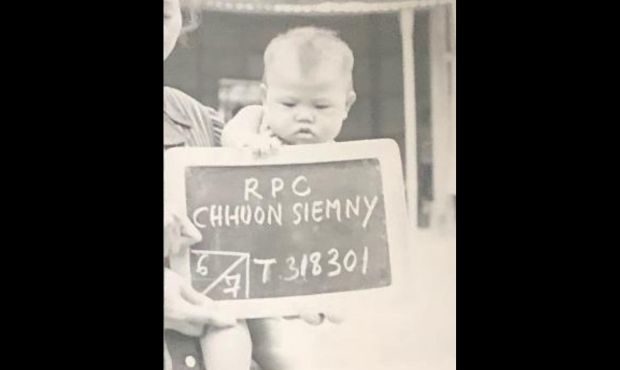KIRO 7 TV anchor says she had to change her Cambodian name to get hired
Mar 24, 2021, 5:18 PM | Updated: Mar 25, 2021, 10:19 am

KIRO 7's Siemny (Chhuon) Kim in the Thai refugee camp where she was born. (Photo courtesy of Siemny Chhuon Kim)
(Photo courtesy of Siemny Chhuon Kim)
Last Friday, motivated by the recent violence and escalation of discrimination toward Asian Americans, KIRO 7 TV anchor and reporter Siemny Kim shared something personal on Facebook.
For her entire career, she’d used her maiden name, Siemny Chhuon, on air. But when she moved to Seattle, the news director at KIRO 7 at the time said she’d have to change her name or she wouldn’t be hired. He said her Cambodian last name would be too difficult for a Monday through Friday audience.
In her Facebook post, Kim wrote: “It’s the name I had when I came to this country, the name I kept when I was naturalized as a U.S. citizen. It’s identifiably Cambodian which makes me very proud. To change it felt like I would be denying my heritage.”
But she took the job and used the last name Kim, her father’s name. She said: “Deep down I knew that this incident is just as anti-Asian as the kids on the playground who refuse to learn and make fun of your name. The only difference is those same kids have grown up and can make powerful decisions about your future — who works and who doesn’t.”
Kim isn’t doing interviews right now, but she gave me permission to tell her story.
Adora Namigadde is a first generation Ugandan-America. In 2014, she had a new job reporting at a TV station.
“One day, my news director brought me into his office, I had just started there,” Namigadde said. “He said, ‘Hey, so I was thinking maybe we could work on something that we could use on-air that’s different from Namigadde so that your name is more relatable to our audience.'”
Namigadde was only 22 years old, she didn’t push back.
“I was honestly so nervous, just starting out in my career, so happy to have my foot in the door. I felt a little strange for the ask, but I told him that I would want to talk to my parents about it before I did that,” she said. “So I talked to my parents and they were like, ‘What! If you don’t use the name Namigadde then no one will know you’re Ugandan!’ Which now, reading between the lines, was kind of the point. My parents were outraged at the thought and they were like, absolutely not.”
Unlike Siemny’s story, Namigadde’s boss let her keep her name and the subject was never brought up again.
“It was made very clear to me early on that my name was not acceptable in this field,” Namigadde said. “My name should be erased and I should use a name that is easier for the average American to say. If America’s truly a salad bowl or a melting pot, whatever we call this place, then why shouldn’t the talent on-air reflect that reality?”
“I know it’s been important for Ugandans in the community to see me on air,” she added. “Hopefully a little Ugandan girl will watch me and see my name and say, ‘Oh yeah, Adora can do that, why can’t I?’ It’s just so important to see yourself, and images of people who look like you, prospering and thriving, no matter what that looks like.”
Namigadde is now a reporter at WOSU, an NPR radio station in Columbus, Ohio.
“Whenever my stuff would air on national, I would get a lot of messages from Ugandans all over the country being like, ‘Oh my gosh! I was driving home from work and then I heard the name Namigadde and I could not believe my ears! I had to look you up right away and send you this message, I’ve never heard a Ugandan on the air before. It was just such a cool experience, thank you for doing what you do.’ Those messages are awesome,” Namigadde said.
We can learn names we’ve never heard before, we just have to listen. We learned to say Schwarzenegger and Galifianakis, so we must extend this courtesy to people of color. And if you feel nervous about botching someone’s name, just ask them how to pronounce it.
“If people ask to say my name, I’m always happy to teach them,” Namigadde said. “I think, in general, these questions that pertain to any part of my Blackness, whether it has to do with saying my name or how my hair works, stuff like that, if people ask things from a humble, genuine place, I’m very happy to share.”
Kim hasn’t made any announcements about whether she’ll be keeping or changing her on-air name, but I encourage you to read her entire post, which is incredibly thoughtful, heartbreaking, and brave.













